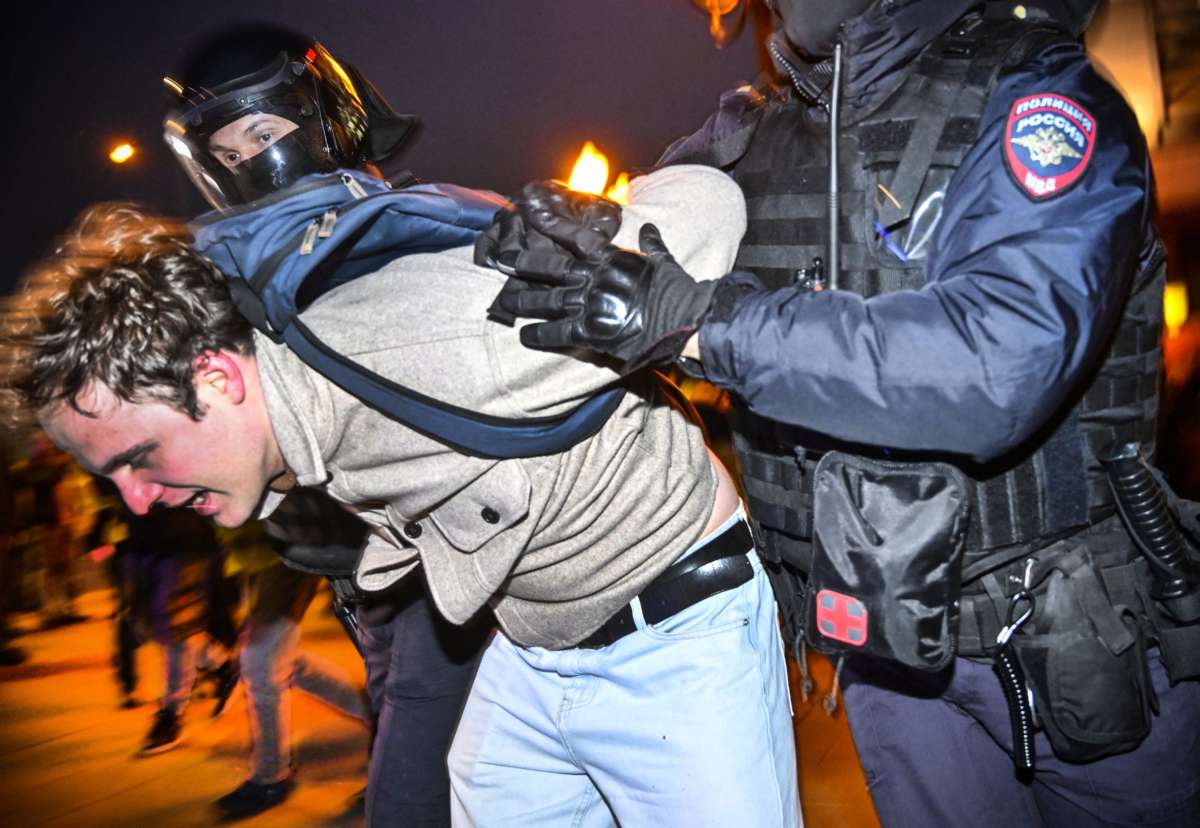Honest, paywall-free news is rare. Please support our boldly independent journalism with a donation of any size.
More than 1,100 people and counting have been arrested at anti-war protests held in 38 cities across Russia following President Vladimir Putin’s Wednesday announcement that as many as 300,000 reservists will be called up to serve in a “partial mobilization” aimed at beating back Ukraine’s counteroffensive.
That’s according to OVD-Info, an independent human rights group based in Russia.
“The most valuable thing that they can take from us is the life of our children,” one unnamed Moscow resident told The Associated Press. “I won’t give them [the] life of my child.” Asked whether protesting would make a difference, she said: “It won’t help, but it’s my civic duty to express my stance. No to war!”
The Vesna anti-war coalition called for demonstrations, declaring: “Thousands of Russian men — our fathers, brothers, and husbands — will be thrown into the meat grinder of the war. What will they be dying for? What will mothers and children be crying for?”
AP reported:
As protest calls circulated online, the Moscow prosecutor’s office warned that organizing or participating in such actions could lead to up to 15 years in prison. Authorities issued similar warnings ahead of other protests recently. Wednesday’s were the first nationwide anti-war protests since the fighting began in late February.
[…]
The state communication watchdog Roskomnadzor also warned media that access to their websites would be blocked for transmitting “false information” about the mobilization. It was unclear exactly what that meant.
Russia’s criminalization of anti-war dissent, journalist and author Laurie Garrett noted on social media, means that it takes “real conviction and courage” for people to hit the streets.
Make no mistake abut it — ANY protest against #Putin or the #RussianUkrainianWar will be dealt with harshly in #Russia. This takes real conviction and courage. https://t.co/qBBrgXF55j
— Laurie Garrett (@Laurie_Garrett) September 21, 2022
Wall Street Journal reporter Matthew Luxmoore shared footage of protests from Moscow and St. Petersburg.
That was Moscow, this is St Petersburg. People marching through the city center denouncing Putin’s war pic.twitter.com/9Mtr1erkO0
— Matthew Luxmoore (@mjluxmoore) September 21, 2022
Andrew Roth, The Guardian’s Moscow correspondent, and Mark MacKinnon, international correspondent for The Globe and Mail, shared footage of people being detained in Russia’s capital.
Arrests on Arbat. Hundreds of Russians protesting the mobilization order chanting “No to War” pic.twitter.com/jhPAWA5vIe
— Andrew Roth (@Andrew__Roth) September 21, 2022
Arrests at an anti-war protest in Moscow. Similar scenes in St. Petersburg. Reports of 190 arrests at 20 (smallish) gatherings in cities across Russia pic.twitter.com/vqTi3yglm5
— Mark MacKinnon (@markmackinnon) September 21, 2022
Russian opposition leader Alexei Navalny said in a video message from jail recorded and published by his lawyers that Putin’s mobilization order makes clear that “the criminal war is getting worse, deepening, and Putin is trying to involve as many people as possible in this.”
“It’s being done just to let one person keep his grip on personal power,” added Navalny.
The Vesna Youth Democratic Movement, meanwhile, issued an online appeal urging Russian soldiers to resist Putin’s war on Ukraine.
“We call on the Russian military in units and at the frontline to refuse to participate in the ‘special operation’ or to surrender as soon as possible,” the group said in a statement posted to its website.
“You don’t have to die for Putin,” the statement continued. “You are needed in Russia by those who love you. For the authorities, you are just cannon fodder, where you will be squandered without any meaning or purpose.”
Trump is silencing political dissent. We appeal for your support.
Progressive nonprofits are the latest target caught in Trump’s crosshairs. With the aim of eliminating political opposition, Trump and his sycophants are working to curb government funding, constrain private foundations, and even cut tax-exempt status from organizations he dislikes.
We’re concerned, because Truthout is not immune to such bad-faith attacks.
We can only resist Trump’s attacks by cultivating a strong base of support. The right-wing mediasphere is funded comfortably by billionaire owners and venture capitalist philanthropists. At Truthout, we have you.
Truthout has launched a fundraiser to raise $41,000 in the next 7 days. Please take a meaningful action in the fight against authoritarianism: make a one-time or monthly donation to Truthout. If you have the means, please dig deep.
